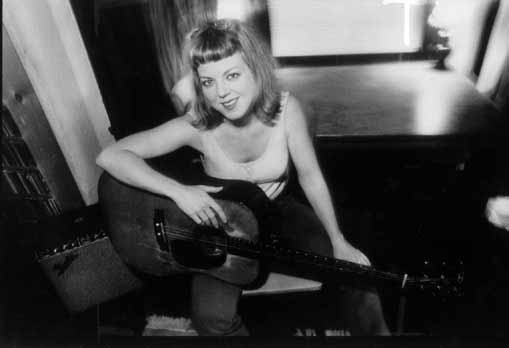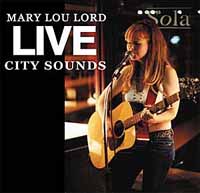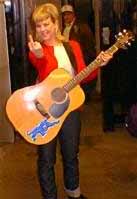|

Mary
Lou Lord: From Street to Stage
story by tim mcmahan
|
|
|
Lazy-i: January 14, 2003
|
Mary Lou
Lord
w/ Adam Goldman, Matt Whipkey, Devon Baker
Thursday, Jan. 23
9 p.m., $7
Sokol Auditorium
13th and Martha
Omaha
|
|
|
Look
at the liner notes of Mary Lou Lord's Live City Sounds, the
CD that she's supporting on a five-city mini-tour that brings her
to Sokol Underground Jan. 23, and you'll notice that it was recorded
in the fall of 2000, more than two years ago.
Seems
Lord has had her hands full the past few years with something more
important than music; namely, Annabelle, her 4-year-old daughter.
This "tour" marks her first venture into the Midwest in
"quite a while. I've been real busy with parenting and working
on a new record," she said.
Not
performing live is a dramatic change for the singer/songwriter who
made a career out of 16 years of singing on the streets and subways
of London and Boston as a busker -- a person who entertains in public
for money. The lifestyle is so ingrained in Lord that Live City
Sounds was recorded in Boston's Park Street subway station and
in Harvard Square, with her pressing the "record" button
on the portable DAT.
|
|
|
Like
any other busker, her repertoire contains more covers than self-written
fare. But the difference is in her obscure choices. Instead of knocking
out well-known standards, Live is an indie music lover's
dream, with covers of songs by Big Star ("Thirteen"),
Richard Thompson ("1952 Vincent Black Lightning," "Beeswing)"
The Pogues ("Sayonara"), Heatmiser ("Half Right"),
The Green Pajamas ("She's Still Bewitching Me") Daniel
Johnston ("Speeding Motorcycle"), and Magnetic Fields
("I Don't Want to Get Over You"), among others.
With only her voice and
her Martin guitar, Lord takes the unfamiliar and makes it uniquely
personal. Her throaty soprano embodies songs that are almost always
about lost love and longing, sung in a voice of a person who's seen
it all and survived, and just wants to tell you about it.
"I didn't plan on
becoming a musician," Lord says in a thick, Boston drawl from
her Beverly, Mass., home. "The money I made singing in the
subway was awful when I first started, but I just kept doing it
nine hours a day because I didn't want to waitress and I was meeting
really fun people. A year after I started I met Shawn Colvin, and
after that all I wanted to do was play this person's songs. It was
before anyone knew who she was, and her songs hadn't been recorded
yet so it was the only way to get them heard.
"Shawn got her record
deal and I got better at performing and started making more money.
The whole time I just wanted to be a producer, but that's not a
world you can just walk into."
Instead, Lord recorded
a number of EPs and singles of her own, which were released on tiny
indie label Kill Rock Stars before catching the ear of someone at
Sony, which released her 1998 full-length debut, Got No Shadow.
The collection includes a number of originals (many co-written with
Nick Saloman of The Bevis Frond) that she'd been singing for years
on the street corner, including an ode to ex-boyfriend Kurt Cobain
called "Some Jingle-Jangle Morning."
Shawn Colvin isn't the
only artist that Lord has championed. Elliott Smith toured as Lord's
opening act for a time, constantly receiving her encouragement because
she knew that one day people would start listening to him.
|

|
"A
year after I started I met Shawn Colvin, and after that all
I wanted to do was play this person's songs."
|
|
|
|

|
"I
don't get the same kick out of it anymore, maybe once in a
while if the night's going good."
|
|
|
Her
latest discovery is a Cadillac, Mich., songstress named Rachael
B. Davis, who Lord says is "hands down the best singer
I've met in my life. She's what you'd get if Sandy Denny and Eva
Cassidy and Billy Holiday had a baby. Her performance is just stunning."
Lord first heard her
music being played on a tiny college radio station. "I got
her address and sent her a gushing fan letter and $20 for a CD,"
she said. "I got this very young, giddy phone call back, with
her saying she'd never played outside of Michigan before. I invited
her to hang out in Boston and set her up in the street and was completely
knocked out. She moved to Boston, and in seven months won the Boston
Music Award and was invited to perform at the Newport and Boston
folk festivals."
Lord says she plans is
to build a record company around Davis and keep her away from the
major labels. "Some people should sign a record deal because
their talent might be limited," Lord said. "Rachael doesn't
have to sign with anyone. At the end of the day, she should own
everything she creates."
Lord sees her work with
Davis as a first step toward a career in publishing, producing and
running her own record label. Until that happens, she still does
her share of busking. "I don't get the same kick out of it
anymore," she said, adding "maybe once in a while if the
night's going good. I did it so long that I'd rather just sit there
and listen to Rachael."
Or, for that matter,
Annabelle, who insists on singing alongside mom in Harvard Square.
"I can't say no," Lord says. "You just know they're
saying, 'Mary Lou has the kid singing already. What a stage mom.'"
She tells young musicians
to try their hand at busking. "I tell them to play in the street.
It's worked out so well for me. Why wait for a club owner to call
you back? If your songs aren't on the radio, you have to get them
to people's ears somehow. If you're playing good songs and good
covers, you'll meet music fans and good friends and DJs and journalists.
It's a great way to get an audience, and you can do it as many times
as you want."
Back to 
Published in The Omaha Weekly-Reader Jan. 15, 2002. Copyright ©
2003 Tim McMahan. All rights reserved.
|
|
| |
|
|
|
